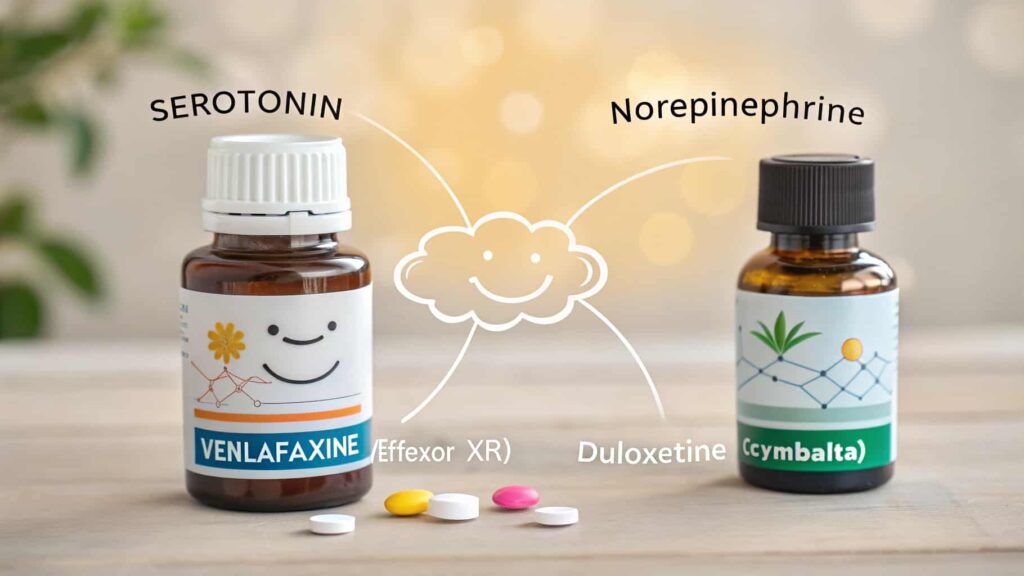Anxiety can affect anyone at any stage of life. It might emerge unexpectedly, triggered by specific situations, or persistently hover in the background. Although occasional anxiety is a normal human response—helping us stay alert in times of stress—intense or chronic anxiety can disrupt our well-being. When these feelings become overwhelming or limit our capacity to engage in everyday activities, we may need some extra support.
Today, a wide range of medications is available to help control symptoms, stabilize moods, and return a sense of normalcy to daily life. However, with so many choices, it can be confusing to figure out which treatment might be right for you. To shed some light on this topic, let us take a closer look at the most common types of anxiety meds and explore how they may fit into a broader mental health plan.
Below, you will find 12 key questions—each addressed in its own section—to guide you through the complexities of anxiety medications. The answers will highlight different drug classes, discuss possible benefits and side effects, and show how these medications can integrate with lifestyle changes and therapy. Let’s get started.
What Is Anxiety And Why Does It Occur?
Anxiety is more than just feeling nervous before an important event. It is a complex emotional and physical reaction to perceived threats—often ones that are magnified in our minds. When you experience anxiety, your body’s alarm system activates, releasing stress hormones like adrenaline and cortisol to help you face or avoid danger.

However, not all anxiety is “helpful” or fleeting. When worry becomes persistent, disproportionate, or uncontrollable, it can interfere with your relationships, job performance, academic achievements, and general quality of life. Several types of disorders fall under the anxiety umbrella, including Generalized Anxiety Disorder (GAD), Social Anxiety Disorder, Panic Disorder, and Phobias.
There are many possible factors behind an anxiety disorder:
- Genetics: Some people inherit a predisposition that makes them more prone to anxiety.
- Brain Chemistry: Neurotransmitter imbalances can foster persistent anxious thoughts and physical symptoms.
- Environment: Chronic stress, trauma, or certain upbringing styles can set the stage for anxiety.
- Medical Conditions: Thyroid problems, heart conditions, and other health issues can mimic or contribute to anxiety symptoms.
If you’re curious about how certain blood pressure drugs might play a role, Lercanidipine and Anxiety is a useful resource. Understanding the root cause of your anxiety can offer clarity on which treatment path, including medication, might be most appropriate.
Why Are Medications an Important Part of Anxiety Treatment?
You may wonder: if talk therapy and lifestyle adjustments are helpful, why take medication at all? The truth is, medication can often be a critical component of an effective treatment program, especially for moderate to severe anxiety disorders.
Key benefits of anxiety medications include:
- Symptom Stabilization: Certain medications can lessen the intensity of fear, panic, and constant worry, allowing you to focus on other vital parts of your life.
- Support for Therapy: Psychotherapy is more successful when symptoms are under control, as overwhelming anxiety sometimes prevents people from fully engaging in therapeutic exercises.
- Physiological Adjustments: Many anxiety symptoms occur because of chemical imbalances in the brain. Medication can help rebalance these neurotransmitters.
- Short-Term Relief: For acute anxiety or panic attacks, quick-acting medications can bring much-needed immediate calm.
That said, medication is rarely the only approach recommended. Rather, it’s often most effective when combined with regular counseling, exercise, proper nutrition, mindfulness practices, and a supportive social environment. If you decide to explore medication, your doctor will likely consider your full health profile, including co-occurring conditions and personal preferences, before prescribing a particular drug.
How Do Selective Serotonin Reuptake Inhibitors (SSRIs) Help?
One of the first lines of defense in treating anxiety is a category of medication called Selective Serotonin Reuptake Inhibitors (SSRIs). These drugs have earned a reputation for balancing mood and easing various forms of anxiety.
Mechanism of Action:
SSRIs increase the level of serotonin available in your brain by blocking its reabsorption (reuptake) at the synapses. Serotonin is a neurotransmitter strongly linked to mood regulation. Higher levels of active serotonin can help stabilize mood and reduce anxious, racing thoughts.
Common Examples:
- Sertraline (Zoloft)
- Paroxetine (Paxil)
- Fluoxetine (Prozac)
- Citalopram (Celexa)
- Escitalopram (Lexapro)
Pros and Cons:
- Advantages: Generally regarded as safe, with a lower risk of severe side effects compared to older antidepressants. They also treat a broad spectrum of anxiety disorders, including social anxiety, obsessive-compulsive disorder (OCD), and post-traumatic stress disorder (PTSD).
- Limitations: SSRIs can take a few weeks to show full benefits. During this period, some individuals might experience transient side effects like gastrointestinal discomfort, headaches, or sexual dysfunction.
SSRIs are popular due to their proven efficacy and relatively favorable safety profile. If one SSRI doesn’t work for you, your physician might suggest trying another in the same class or moving on to a different class of medications.
Are SNRIs A Good Alternative For Certain Conditions?
Serotonin-Norepinephrine Reuptake Inhibitors (SNRIs) are a type of medication that can be really helpful for people dealing with both anxiety and depression—especially if they also struggle with chronic pain or low energy. Unlike SSRIs, SNRIs work on two brain chemicals: serotonin (for mood) and norepinephrine (for alertness and focus).

This extra boost can make a big difference for those who feel tired, unmotivated, or physically drained. Medications like Venlafaxine (Effexor XR) and Duloxetine (Cymbalta) fall into this group. While they can be very effective, they might also cause side effects like dizziness, trouble sleeping, or increased blood pressure—so it’s important to check in regularly with your doctor to make sure everything is on track.
Where Do Tricyclic Antidepressants Fit in Modern Treatment?
Tricyclic Antidepressants (TCAs) represent an older class of medications that effectively boost serotonin and norepinephrine levels, but they often come with a more demanding side effect profile. They are sometimes used as second- or third-line treatments when SSRIs or SNRIs prove ineffective or intolerable.
Common Examples:
- Amitriptyline (Elavil)
- Nortriptyline (Pamelor)
- Imipramine (Tofranil)
Pros:
- Efficacy: Powerful for anxiety and depression that does not respond to newer medications.
- Chronic Pain Relief: Some TCAs help with specific pain conditions like migraines or neuropathic pain, which may accompany anxiety in some individuals.
Cons:
- Anticholinergic Effects: Dry mouth, constipation, blurred vision, and urinary retention.
- Weight Gain and Sedation: Can impact daily energy levels and overall sense of well-being.
- Risk in Overdose: Overdosing on TCAs can be more dangerous compared to SSRIs or SNRIs.
Because of their side effects, many doctors prefer starting with SSRIs or SNRIs. However, TCAs remain a critical option for individuals whose anxiety is resistant to first-line treatments.
Can Benzodiazepines Provide Quick Relief?
When anxiety flares into a panic attack or becomes debilitating in a moment, Benzodiazepines can offer rapid relief. They work by enhancing the calming effects of gamma-aminobutyric acid (GABA), a neurotransmitter that slows down activity in the brain.
Popular Benzodiazepines:
- Alprazolam (Xanax)
- Lorazepam (Ativan)
- Diazepam (Valium)
- Clonazepam (Klonopin)
Benefits:
- Immediate Efficacy: Can alleviate acute symptoms within minutes to an hour.
- Muscle Relaxation: Reduces tension and can assist in easing insomnia related to anxiety.
Drawbacks:
- Dependence and Tolerance: Long-term use may require progressively higher doses to achieve the same effect.
- Withdrawal: Abrupt discontinuation can result in severe withdrawal symptoms, including seizures in rare cases.
- Cognitive Effects: Drowsiness, difficulty with memory, and slower reaction times are common.
Because of dependence concerns, benzodiazepines are often recommended for short-term or intermittent use, rather than as a mainstay for daily, long-term anxiety management.
How Do Beta-Blockers Calm the Physical Symptoms of Anxiety?
Beta-blockers are primarily used to treat high blood pressure and cardiovascular issues. However, they have found a place in anxiety management, particularly for those dealing with performance anxiety or specific phobias that produce intense physical symptoms.
How They Work:
By blocking beta receptors in the heart and vascular system, beta-blockers reduce the influence of adrenaline, thereby slowing heart rate, controlling tremors, and minimizing sweating.
Common Examples:
- Propranolol (Inderal)
- Atenolol (Tenormin) (less common for anxiety)
Situations Where They Shine:
- Stage Fright: Public speakers, musicians, and students taking exams often use beta-blockers to manage shaky hands, rapid heartbeat, and cold sweats.
- Avoidance of Sedation: Beta-blockers do not typically cause mental fogginess or sedation like benzodiazepines.
Things to Note:
- Side Effects: Fatigue, dizziness, or cold extremities may occur.
- Respiratory Concerns: Beta-blockers can exacerbate conditions like asthma.
Overall, beta-blockers are most effective when managing the bodily, physical manifestations of anxiety rather than persistent anxious thoughts.
Is Buspirone a Suitable Choice for You?
Buspirone provides a unique approach among the types of anxiety meds, working on specific serotonin receptors without sedating effects or the risk of dependency seen with benzodiazepines. It is generally considered a well-tolerated option but may not be suitable for everyone.
Mechanism:
Buspirone influences serotonin levels, though it does so differently than SSRIs. It modulates neurotransmitter receptors in a way that reduces overall hyperarousal in the brain.
Main Advantages:
- No Major Sedation: Less likely to cause drowsiness.
- Lower Risk of Abuse: It doesn’t have significant withdrawal issues or abuse potential.
- Long-Term Use: Often feasible to continue buspirone for months or years if anxiety is chronic.
Limitations:
- Slow Onset: Results can take a few weeks to become noticeable.
- Variable Efficacy: Some people respond remarkably well, while others see minimal benefit.
If you’re concerned about dependence issues related to benzodiazepines or the side effects of SSRIs, buspirone might be a viable alternative to explore under professional supervision.
Should You Worry About MAOIs’ Dietary Restrictions?
Monoamine Oxidase Inhibitors (MAOIs) are a more traditional class of medication, often reserved for treatment-resistant cases of anxiety or depression. They can be very effective but come with significant considerations, particularly around diet.
Mechanism:
MAOIs inhibit the enzyme that breaks down serotonin, norepinephrine, and dopamine in the brain. By limiting this breakdown, more of these neurotransmitters remain available, boosting mood and potentially lessening anxiety.
Examples:
- Phenelzine (Nardil)
- Tranylcypromine (Parnate)
- Selegiline (Emsam) (patch form)
Why the Dietary Rules?
MAOIs can interact with tyramine—a substance found in aged cheeses, cured meats, some alcoholic beverages, and certain fermented or pickled foods. These interactions may lead to dangerous spikes in blood pressure. Additionally, combining MAOIs with some other medications, including many over-the-counter cold remedies, can be hazardous.
Important Considerations:
- Strict Monitoring: Requires consistent oversight from a healthcare provider.
- High Efficacy: When used correctly, MAOIs can be a powerful solution for individuals who have not found relief with other treatments.
Given these constraints, MAOIs are less frequently prescribed today. Still, they remain an essential option for some people with stubborn anxiety or depression.
What About Less Common Or Emerging Anxiety Medications?
Beyond the standard prescriptions—SSRIs, SNRIs, TCAs, benzodiazepines, buspirone, beta-blockers, and MAOIs—several other treatments are gaining attention. These emerging or less common options may be suitable for specific situations, though they are not yet mainstream.

- Atypical Antipsychotics: Low-dose quetiapine (Seroquel) or other similar drugs can sometimes be used off-label to help regulate severe anxiety, particularly if there are co-occurring mood or psychotic features.
- Antihistamines (e.g., Hydroxyzine): Might be used short-term for anxiety due to their sedative properties, but they can cause drowsiness.
- Anticonvulsants (Pregabalin, Gabapentin): Originally developed for seizures or nerve pain, these can sometimes help reduce anxiety, especially in specific conditions.
- Ketamine & Esketamine: Mostly studied for treatment-resistant depression, but researchers are also exploring their potential in severe or refractory anxiety disorders.
- Cannabidiol (CBD): Some people report anxiety relief with CBD products. However, regulations and evidence vary, so it’s wise to consult a healthcare professional.
Staying informed about the latest research in psychopharmacology can be beneficial—especially if you have struggled to find a medication that works for your particular circumstances.
Do Lifestyle Changes and Therapy Enhance Medication Effects?
Medication can do a lot, but it rarely addresses every aspect of what fuels anxiety. That’s why mental health professionals often recommend combining medication with non-pharmacological strategies:
Psychotherapy:
- Cognitive Behavioral Therapy (CBT): Teaches new ways to reframe anxious thoughts and behaviors.
- Exposure Therapy: Gradually helps you face feared objects or situations in a safe environment.
- Mindfulness-Based Practices: Trains you to stay present and reduce rumination on past or future anxieties.
Lifestyle Modifications:
- Exercise: Research shows that regular physical activity can significantly lower stress and anxiety levels.
- Healthy Diet: Nutrient-rich foods can influence neurotransmitter function and overall mental health.
- Adequate Sleep: Poor sleep worsens anxiety; good sleep hygiene is essential for improvement.
Social Support:
- Support Groups: Sharing experiences can normalize and destigmatize anxiety.
- Open Communication: Talking with friends or family about anxiety can relieve some emotional burdens.
When medication is used alongside these lifestyle and therapeutic interventions, many people find deeper, long-lasting relief from debilitating anxious thoughts and feelings.
How Do You Determine the Right Treatment Path?
Deciding on the right approach can feel daunting. Each of the types of anxiety meds comes with its own potential benefits and concerns. Identifying the best fit involves a nuanced and collaborative approach:
- Medical Evaluation: A thorough exam to rule out any underlying medical conditions that might be triggering or exacerbating anxiety.
- Psychiatric Assessment: A mental health specialist will evaluate your symptoms, history, and treatment preferences, possibly having you complete questionnaires or scales to measure anxiety severity.
- Trial Period and Monitoring: A chosen medication may require several weeks to show results. If it isn’t effective or side effects become unmanageable, a different medication or a new dosage may be recommended.
- Holistic Integration: Incorporating therapy, diet, exercise, and stress reduction techniques can maximize the benefits of your medication.
- Open Dialogue: Communication is key. Report side effects, successes, concerns, and changes in symptoms to your healthcare provider so they can tailor the plan to your needs.
Remember that finding the right treatment often involves patience and self-compassion. The journey to managing anxiety is rarely a straight path, but with careful guidance and consistent support, it is possible to regain control and find enduring relief.
What Are The Common Anxiety Medications And Their Effects?
Below is a quick-reference table summarizing the principal classes of medications for anxiety, their mechanism, a few examples, typical uses, and potential side effects. For an even broader look, some people consult an Anti-Anxiety Drugs List (Alphabetical) to compare different treatment options.
| Medication Class | Mechanism of Action | Common Examples | Typical Uses | Potential Side Effects |
|---|---|---|---|---|
| SSRIs | Increase serotonin by blocking its reabsorption | Prozac, Zoloft, Paxil, Lexapro, Celexa | First-line for GAD, social anxiety, OCD, PTSD | GI issues, headaches, sexual dysfunction, insomnia/drowsiness |
| SNRIs | Block reuptake of serotonin and norepinephrine | Effexor XR, Cymbalta | Anxiety with coexisting depression or chronic pain | Elevated blood pressure, GI problems, insomnia, sexual side effects |
| TCAs | Boost levels of serotonin/norepinephrine by blocking reuptake | Amitriptyline, Nortriptyline, Imipramine | Resistant anxiety or depression, chronic pain | Dry mouth, sedation, weight gain, potential overdose risks |
| Benzodiazepines | Enhance GABA, providing rapid calming | Xanax, Valium, Ativan, Klonopin | Short-term relief for acute anxiety or panic | Dependence, withdrawal, sedation, cognitive dulling |
| Beta-Blockers | Block adrenaline’s physical effects (lower HR, tremors) | Propranolol, Atenolol | Performance anxiety, situational social anxiety | Fatigue, dizziness, cold extremities, respiratory caution |
| Buspirone | Modulates serotonin receptors without sedation | Buspirone (Buspar) | Generalized anxiety, long-term management | Headaches, nausea, dizziness, lower dependency potential |
| MAOIs | Block enzyme that breaks down serotonin, norepinephrine, dopamine | Phenelzine, Tranylcypromine, Selegiline | Treatment-resistant anxiety or depression | Dietary restrictions (tyramine), serious drug interactions |
How Do You Choose The Right Path For Your Anxiety?
Choosing the right medication is a personal and sometimes complex decision. A qualified mental health professional, such as a psychiatrist, can evaluate your symptoms, medical history, lifestyle, and treatment preferences to recommend a suitable plan. The process might involve:

- Initial Consultation: Discuss your primary concerns, previous treatments, and any current medications or supplements.
- Trial and Observation: Medications like SSRIs or SNRIs can take weeks to show full effects. During this window, you’ll evaluate side effects, dosage levels, and symptom reduction.
- Routine Follow-Ups: Regular check-ins allow for adjustments in dosage or medication type. It’s common to switch from one medication to another if you don’t achieve the desired result.
- Combining Approaches: You might find additional relief by adding therapy or lifestyle interventions. Some people also benefit from short-term benzodiazepines while waiting for SSRIs to take effect.
- Long-Term Strategy: Depending on your response, you might stay on medication for an extended period or gradually taper off under medical supervision once you’ve achieved stability.
FAQs:
How long does it take for anxiety medication to start working?
Some medications like benzodiazepines work within minutes, while SSRIs and SNRIs usually take 2–6 weeks. It’s important to be patient and consistent with your dosage. Improvement is often gradual but noticeable over time.
Can I take anxiety medication while pregnant?
Some medications may be considered safe during pregnancy, while others carry risks. Your doctor will weigh the benefits against potential harm to you and the baby. Never start or stop medication without medical advice during pregnancy.
What happens if I suddenly stop taking my medication?
Stopping anxiety meds abruptly can cause withdrawal symptoms like dizziness, mood swings, or flu-like symptoms. It’s best to taper off slowly under medical supervision. Sudden discontinuation is especially risky with benzodiazepines and SSRIs.
Are natural remedies better than medications?
Natural remedies like herbal teas, supplements, or mindfulness can help mild anxiety, but they may not be enough for moderate to severe cases. Medications can offer stronger, clinically-proven relief when needed. A balanced approach often works best.
What should I do if my anxiety meds aren’t working?
If you don’t see improvement after a few weeks, talk to your doctor. They may adjust the dose, switch medications, or recommend adding therapy. Finding the right med can take some trial and error, so don’t give up.
How can I support my anxiety treatment beyond medication?
Therapy, exercise, sleep, mindfulness, and reducing caffeine can all boost your progress. Medication helps manage symptoms, but lifestyle changes create long-term resilience. A well-rounded routine often leads to better, lasting results.
Can I drink alcohol while on anxiety meds?
It’s generally advised to avoid alcohol while on anxiety medication, especially benzodiazepines. Alcohol can interfere with how the meds work and increase side effects like drowsiness. Always ask your doctor before mixing the two.
Conclusion
All in all, there are many types of anxiety meds you can explore, each aiming to bring balance to your mind and body. They can ease constant worries, lessen panic attacks, or stabilize low moods, depending on your unique needs. However, every medication comes with pros, cons, and possible side effects. While SSRIs, SNRIs, benzodiazepines, and others each serve a purpose, finding the right fit often takes time and patience.
Always remember that medication is just one piece of the puzzle—therapy, healthy habits, and a supportive network matter greatly. By working closely with a healthcare professional, you can discover a treatment plan that truly helps you live with less anxiety and more peace of mind.
Also Read:








Leave a Reply